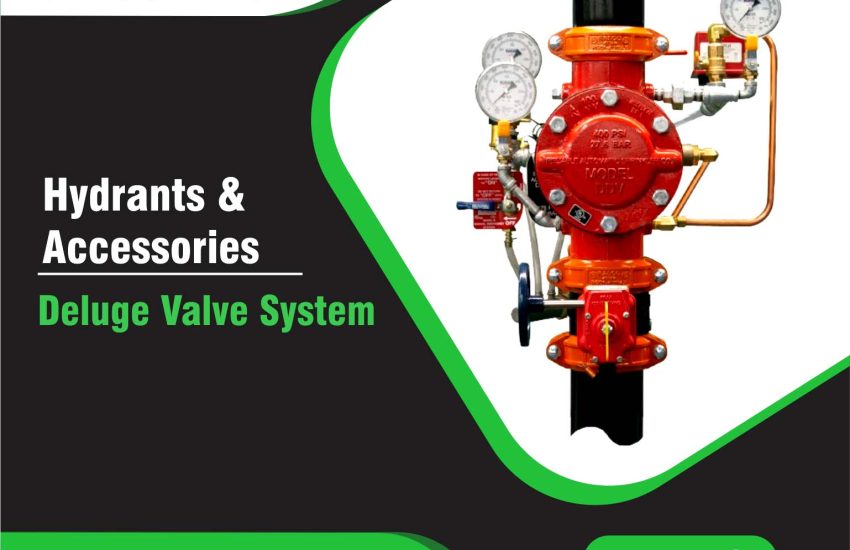Deluge Valve System is a crucial component in fire protection. It controls water flow to a fire suppression system and ensures rapid coverage during an emergency. Unlike traditional sprinklers, deluge valves discharge water to all sprinklers at once, providing immediate response. In this article, we will explore the specifications, features, and benefits of deluge valve systems.
What is a Deluge Valve System?
A deluge valve system consists of a deluge valve that releases water to all sprinklers upon activation. The valve typically opens when it receives a signal from fire detection systems, such as smoke or heat detectors. When activated, the system provides an immediate, large-volume water flow, ideal for high-hazard areas like chemical plants or power stations.
Key Specifications of Deluge Valve Systems
When selecting a deluge valve system, it’s important to consider several specifications:
1. Deluge Valve Type
- Hydraulic Deluge Valve: These valves rely on water pressure to operate. They are highly reliable and used in areas with stable water supplies.
- Electric Deluge Valve: Electric valves activate through electrical signals. They offer quick response times, often used in more complex systems.
- Pneumatic Deluge Valve: These valves use air pressure to control water flow and are ideal where electrical systems aren’t available.
2. Valve Material
- Bronze: Deluge valves made of bronze are durable and resistant to corrosion. They work well in moist environments.
- Stainless Steel: Stainless steel valves resist corrosion and are perfect for harsh conditions like coastal areas or chemical plants.
- Cast Iron: Cast iron valves are stronger and suited for high-pressure applications.
3. Flow Rate
- The flow rate defines the volume of water the system can handle. Deluge valve systems typically support flow rates from 100 GPM to 5000 GPM, depending on facility size and fire risk.
4. Activation Mechanism
- Automatic Activation: The deluge valve opens automatically when a fire detection system sends a signal.
- Manual Activation: In some cases, you can activate the system manually through a remote control or pull station.
5. Pressure Rating
- Most deluge valve systems have pressure ratings between 150 psi and 300 psi, depending on the water supply and system requirements.
6. Temperature Rating
- Deluge valves are available in temperature ratings from 32°F to 160°F, catering to various environmental conditions.
7. Control Panel
- The control panel manages the deluge valve system. It integrates with fire detection systems, allowing quick and easy operation during an emergency.
8. Flow Control Devices
- Devices like pressure switches and waterflow detectors help monitor water flow, ensuring the system operates as intended.
Features of Deluge Valve Systems
High-quality deluge valve systems offer several features:
- Immediate Activation: The valve opens as soon as a fire is detected, ensuring fast response.
- Comprehensive Coverage: The system ensures that all sprinklers release water simultaneously, covering the entire hazard area.
- Enhanced Control: Fire safety personnel can easily monitor and control the system via the control panel.
- Corrosion Resistance: Materials like bronze, stainless steel, and cast iron prevent rust and ensure the system lasts longer.
- High Water Flow: Deluge valves are designed for high water flow, handling large volumes of water during emergencies.
- Integration with Fire Detection Systems: The system integrates with smoke and heat detectors to activate the valve quickly.
Benefits of Deluge Valve Systems
The deluge valve system provides several key benefits:
1. Rapid Fire Suppression
- Deluge valves ensure quick water discharge, suppressing fires before they spread.
2. Enhanced Safety in High-Hazard Areas
- These systems are ideal for high-risk environments like chemical plants and storage facilities. The immediate water flow helps prevent larger fires.
3. Reliability
- Built with durable materials like stainless steel, these systems provide long-lasting protection, even in extreme conditions.
4. Reduced Water Damage
- Since water only flows when necessary, deluge valves prevent excessive water discharge and minimize water damage.
5. Automatic Activation
- Deluge valve systems activate automatically, ensuring a prompt response without delay.
6. Adaptability
- The system can be adapted to work with different fire detection systems and water supplies, providing flexibility for various facilities.
7. Minimized Downtime
- In industrial settings, the deluge valve system helps reduce downtime by protecting equipment from fire damage.
Maintenance and Care of Deluge Valve Systems
Proper maintenance is essential for ensuring the system works effectively. Here are some maintenance tips:
- Regular Inspections: Inspect the system periodically to check for damage, corrosion, or malfunctioning components.
- Test the System: Test the valve regularly to ensure it activates properly when required. Check for adequate water flow and pressure.
- Calibrate Sensors: Ensure that the sensors, such as smoke and heat detectors, are correctly calibrated to trigger the valve when a fire occurs.
- Clean the Valve: Keep the valve clean and free of debris to prevent blockages and ensure smooth water flow during activation.
Conclusion
The deluge valve system is an essential component for fire protection in high-risk environments. With features such as automatic activation, high water flow, and corrosion-resistant materials like stainless steel and bronze, it offers effective fire suppression. Proper maintenance ensures the system works as intended when emergencies arise. If you’re looking for reliable fire protection, investing in a deluge valve system provides peace of mind and enhanced safety.


